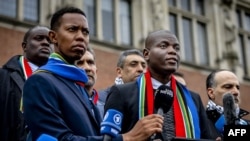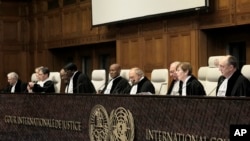Fighting “human animals.” Making Gaza a “slaughterhouse.” “Erasing the Gaza Strip from the face of the earth.”
Such inflammatory rhetoric is a key component of South Africa’s case accusing Israel of genocide at the U.N. world court, a charge that Israel denies. South Africa says the language — in comments by Israeli leaders, soldiers and entertainers about Palestinians in Gaza since Hamas’ Oct. 7 attack sparked war — is proof of Israel’s intent to commit genocide.
Israeli leaders have downplayed the comments, and some in Israel say they're a result of the trauma from Hamas' attack.
Rights groups and activists say they're an inevitable byproduct of Israel's decades-old, open-ended rule over the Palestinians and that they've intensified during the war. They say such language has been left unchecked, inciting violence and dehumanizing Palestinians.
“Words lead to deeds,” said Michael Sfard, a prominent Israeli lawyer. “Words that normalize or legitimize serious crimes against civilians create the social, political and moral basis for other people to do things like that.”
The genocide case against Israel opened last week at the International Court of Justice at The Hague. South Africa is looking to prove that Israel is committing genocide in Gaza and that Israel has specific intent to commit genocide. It is using the litany of harsh statements as part of the evidence in its case.
The Comments
With the ground offensive getting underway in late October, Prime Minister Benjamin Netanyahu cited the Bible in a televised address: “You must remember what Amalek has done to you.” Amalekites were persecutors of the biblical Israelites, and a biblical commandment says they must be destroyed.
South Africa argued that the remarks showed Israel's intent to commit genocide against Palestinians. Netanyahu denied that this week and said he was referring to Amalek as a way to describe Hamas and its attack.
Two days after the Hamas attack, Defense Minister Yoav Gallant said Israel was “fighting human animals,” in announcing a complete siege on Gaza.
Deputy Knesset speaker Nissim Vaturi from the ruling Likud party wrote on X, formerly known as Twitter, that Israelis had one common goal, “erasing the Gaza Strip from the face of the earth.” Israeli Heritage Minister Amichay Eliyahu, from the far-right Jewish Power party, suggested that Israel drop a nuclear bomb on Gaza and said there were “no uninvolved civilians” in the territory.
Israeli soldiers caught on video made similar remarks as they sang and danced in the early days of Israel’s ground offensive.
On October 7, a journalist wrote on X that Gaza should become “a slaughterhouse” if the roughly 250 people taken hostage by Hamas were not returned.
Military officials and two Israeli pop singers are also cited by South Africa for making inflammatory comments.
“The language of systemic dehumanization is evident here,” lawyer Tembeka Ngcukaitobi said for South Africa in remarks before the court. “Genocidal utterances are therefore not out in the fringes. They are embodied in state policy.”
South Africa is asking for a series of legally binding rulings declaring that Israel is breaching “its obligations under the Genocide Convention” — a decision that could take years — and for a binding interim order that Israel cease hostilities, a ruling on which is expected in the coming weeks.
Israel's Response
Defending Israel in court, lawyer Malcolm Shaw said the remarks were made mostly by officials with little role in determining Israeli policy, calling them “random quotes” that were misleading and had been in some cases repudiated by Netanyahu.
But Roy Schondorf, a former Israeli deputy attorney general, said in an interview that the statements still carried risk, even out of context: “It would have been better if some of these remarks had not been said.”
Israel argued that its justice system would take action against unacceptable speech. But critics say statements against Palestinians have gone unpunished or undenounced. Lawyer Sfard appealed to the country’s attorney general earlier this month on behalf of a group of prominent Israeli figures, demanding to know why the rhetoric hasn't been reined in.
In a statement two days before the case launched at the world court, Attorney General Gali Baharav-Miara said calling for intentional harm to civilians could amount to a criminal offense and that Israeli authorities were examining several such cases, without elaborating. The comments appeared to be aimed at heading off the South African accusations.
Overall, Israel vehemently denies the charges at the world court. Israel says it's fighting a war of self-defense against Hamas after it killed 1,200 people, mostly civilians.
Israeli officials say the country adheres to international law and does its utmost to protect civilians, blaming the high death toll on Hamas for embedding in civilian areas. More than 24,000 people have been killed in Gaza, mostly women and children, according to the Health Ministry in Hamas-ruled Gaza.
Israel also says it is Hamas that exhibited genocidal actions with its attack and genocidal intentions with its violent speech against Israelis, including promises to repeat the October 7 assault and the group’s commitment to Israel’s destruction.
The Rhetoric's Move to the Mainstream
The war is being fought under Israel’s most hardline government ever, dominated by far-right Cabinet ministers with a long record of controversial remarks well before October 7.
Finance Minister Bezalel Smotrich once called for “erasing” a Palestinian West Bank town. National Security Minister Itamar Ben-Gvir talked of the supremacy of freedom of movement for Jewish West Bank settlers over that same right for Palestinians.
And since October 7, such speech has moved further into the mainstream.
Israelis, like Palestinians, have been hardened by decades of deadly conflict and its sense of intractability. Some in Israel say the trauma of Hamas’ unprecedented attack unleashed the current discourse.
“The intense collective trauma gave free rein to the expression of dark feelings of revenge that in the mainstream was less pleasant to utter until today,” deputy editor-in-chief Noa Landau wrote in the daily Haaretz. She said the statements reflected “the social zeitgeist.”
While little appears to have been done to confront violent rhetoric directed at Palestinians, Palestinian citizens of Israel who have shown empathy for people in Gaza are facing a crackdown, according to Adalah, a legal rights group. Police say the speech amounts to incitement, promotes violence or shows support for terror groups.
Adalah says at least 270 Palestinian citizens of Israel have had some sort of interaction with law enforcement — arrests, investigations or warnings, with at least 86 charged for speech offenses. Some Jewish Israelis who expressed sympathy for Palestinians have also faced arrest or sanction by their employers.
Aeyal Gross, a professor of international law at Tel Aviv University, said that how Israel responds to the inflammatory rhetoric matters in the case with South Africa, because Israel, as a signatory to the Genocide Convention, is prohibited not only from committing genocide but also from inciting to genocide.
Gross said that it was probably too late for Israel to take steps that show it doesn’t condone such speech. Punishing such remarks could have sent a message to the court as well as to Israeli society that the state doesn’t tolerate incendiary rhetoric.
“It’s important because it would have said, ‘It’s not our intent,’" he said. "But it’s also important because it would have meant we are sending the soldiers on the ground a message not to act in this way.”










Forum